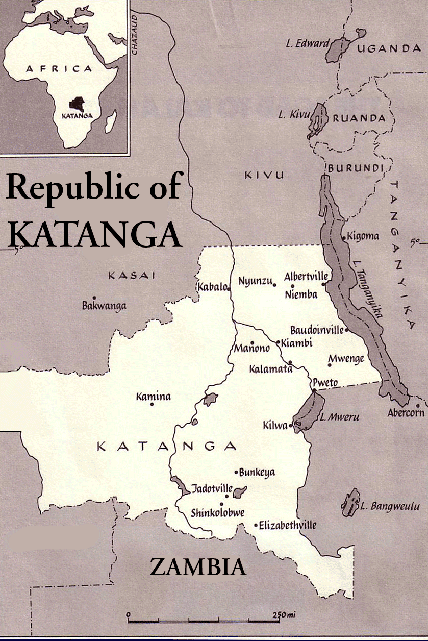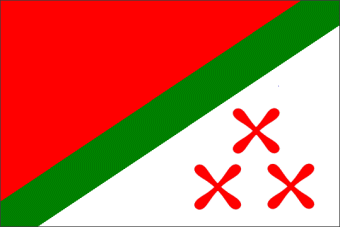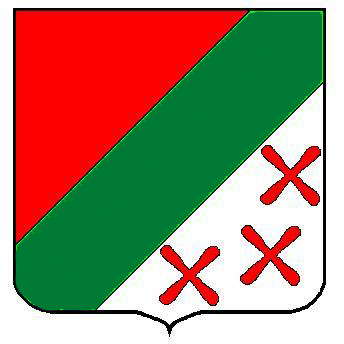
Katanga
Free State
Etat Libre du Katanga
Inchi ya Katanga
Katanga Atawina!
The Katanga Free State, was
connected in 1900 with the Independent State of Congo, and in 1908, with
the colony of Belgian Congo. On July 11, 1960, less than two weeks after
the Independence of Congo, the Katanga National leader Moise Tshombe, declared
the Katanga Free State independent from the Congo.
The red colour symbolises the bravery of
the people and the blood which it shed to defend its homeland, the green
the hope and the silver the purity; the small copper crosses (called "monetary
crosslets of Katanga") were the emblems of King (Mwami) Siri who governed
this Katanga (the Realm of Garengaze) and symbolise the copper mining wealth
of Katanga Free State.
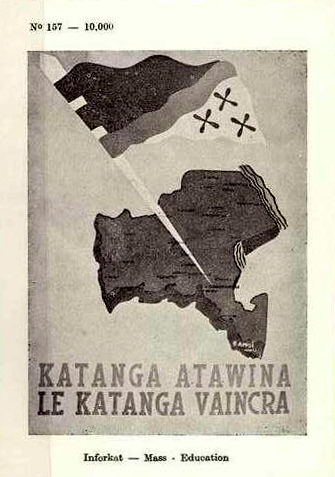
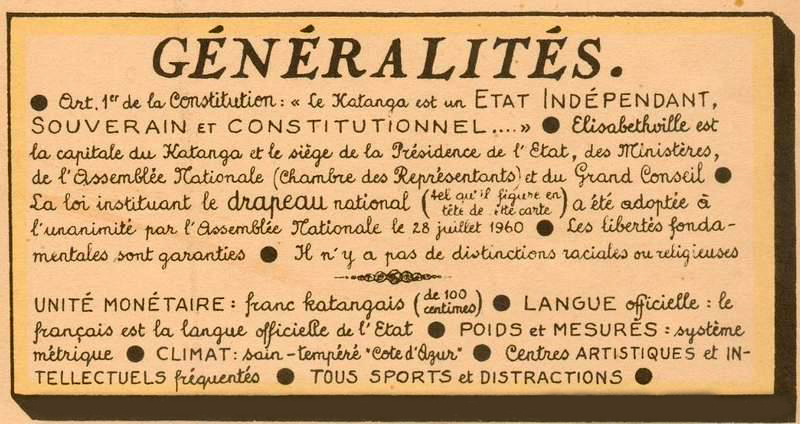
Katanga throughout
its History has always been a separate Nation
If left to run Katanga by themselves black
and white Katangese could have created a great multiracial nation and made
famous success of it. Katanga would have been a shinning example to the
rest of Africa, even the world. This magnificent occasion was lost in 1963,
largely because the interference by an ignorant American administration,
which knew nothing of Africa on the one hand, and the stupidity of the United
Nations, which knew, even less on the other. As a result, the birth right
of all Katangese black and white had been forfeited and the clock put back
another twenty years.
Katanga throughout its History has always
been a separate Nation. Katanga has always been a separate country from
that so called DRC, Katanga is fundamentally different in many important
respects from the other regions. It was only the drawing of arbitrary boundaries
on a map in 1885 at some conference in Europe that had turned the Nation
of Katanga into part of the DRC, a hodgepodge of over two hundred twenty
different Tribes. Geographically too Katanga and the other provinces were
different. The Katangese terrain for a start was high and open, mostly ranch
type country unsuitable for agriculture, unlike the rest of the other regions.
Then again the Katangese spoke Swahili, the other regions spoke Chiluba,
Lingala and Kikongo. The Katangese find irksome and impractical to be ruled
by a remote legislature in Kinshasa some 2,500km away. Ethnically Katanga’s
People are entirely separate from the other Tribes in the DRC as well.
The difference between the Katangese and
the People of Bas-Kongo is as marked as that between a Ukrainian in Russia
and a Flamand in Belgium.
The tragedy of the Katangese politics is
that Katanga between 1961 an 1963 had become a political football game.
Too many outsiders, many of them newly independent African states like Ghana,
with no real knowledge of the country or its problems, where involved in
deciding its future, for that reason that had nothing whatever to do with
the DRC. Even the Belgians themselves had done much to force Patrice Lumumba
on the DRC as its first prime minister – Lumumba, an ex-postal clerk
who had to be taken out of prison, where he was serving a sentence for petty
theft, in order to attend the very conference in Brussels which then brought
him to power! And why? Because the Belgian government wanted a unitary state
so that Belgium could perpetuate its control of the DRC, and Lumumba was
the only politician whose manifesto would have permitted that policy.
Edouard Lambrette
In "The Road
to Kalamata", Page 111
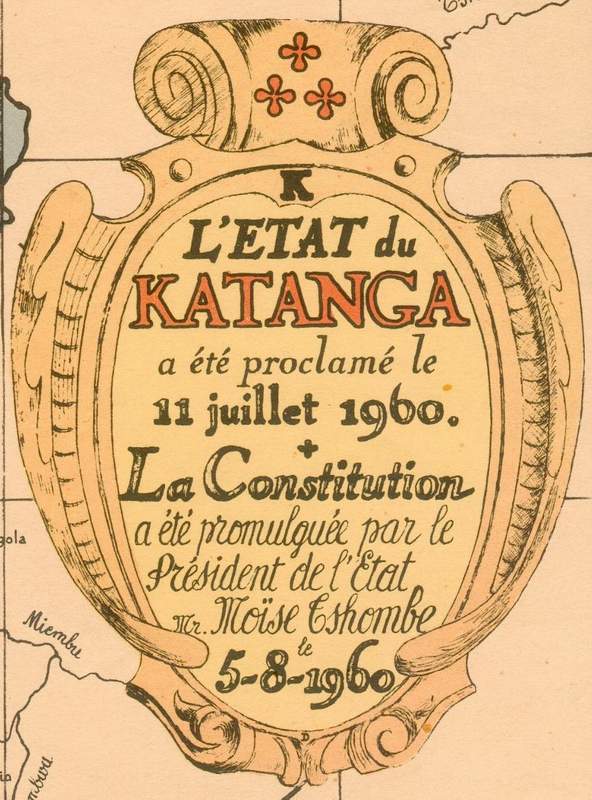
National
Name:
Katanga Free State
/
Jamhuri ya Katanga
President:
Prime
Minister:
Population:
6.900.000
Area:
538,000
sq km (larger than California)
Major
languages:
Swahili (official Governmental) is the National languages of
Katanga Free State
.
The
Official Government Languages are Swahili and English being the official
commercial language of
Katanga
Free State
for trade and international relations.
Life
expectancy:
60
years (men), 65 years (women)
Main
exports:
Farming
and ranching are carried out on the Katanga Plateau. In the eastern part
of Katanga is a rich mining region, which supplies cobalt, copper, tin,
radium, uranium, and diamonds.
GNI
per capita:
US $120
International dialling code (provisional)
:
+243
Capital and largest city:
Lubumbashi
"L'shi " (lies at around 1,000 metres above sea level).
Other
large cities:
Monetary unit:
1
Shaba = 100 cents
Major
religions:
African
Spirituality and
Christianity
Literacy rate:
66%
Economic summary:
GDP/
PPP
$6.37
billion; per capita $800.
Real
growth rate:
6.5%. Inflation: 9% (2004 est.).
Unemployment:
n.a.
Arable land:
Agriculture:
coffee, sugar, palm oil, rubber, tea, quinine, cassava
(tapioca), bananas, root crops, corn, fruits; wood products.
Labour force:
n.a.
Industries:
Natural resources:
Exports:
$308 billion f.o.b. (2004 est.):, copper, crude oil, coffee, cobalt.
Imports:
$519 billion f.o.b. (2004 est.): foodstuffs, mining and other machinery,
transport equipment, fuels.
Major
trading partners:
Belgium, Finland, U.S., South Africa, France, Zambia, Kenya, Germany (2004).
Communications:
Telephones: main lines in use: 2,000 (2002); mobile cellular:
500.000 (2003). Radio broadcast stations: AM 1, FM 4, shortwave 1 (2001).
Television broadcast stations: 1 (2001).
Internet hosts:
45 (2003). Internet users: 5,000 (2002).
Transportation:
Ports
and harbors:
Airports:
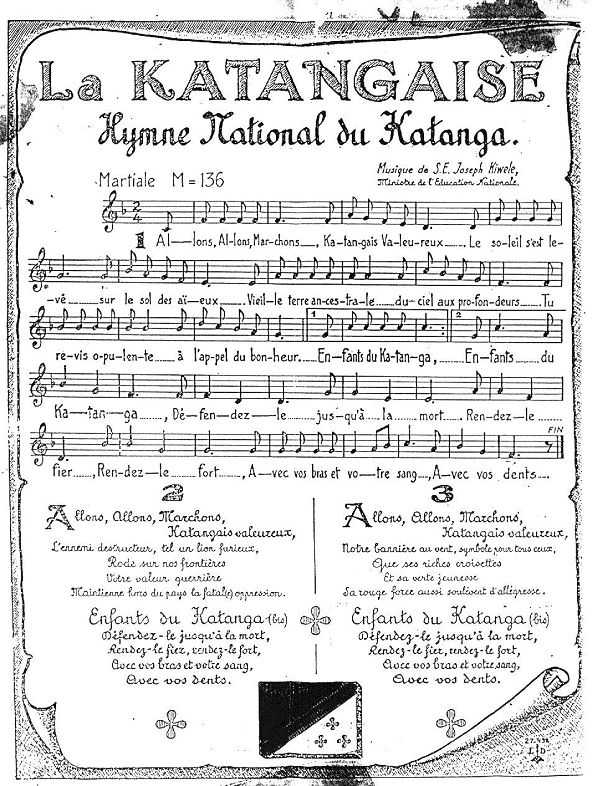
Texte et musique
de Joseph Kiwele pour la Katangaise
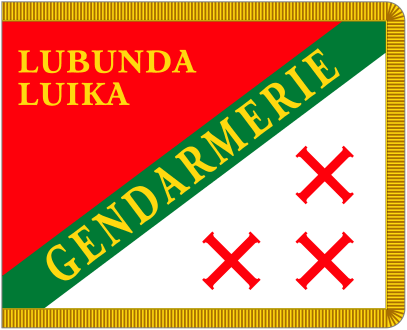
Moïse Tshombe
issu de chefs Lunda, plus précisément du
clan des Amalas, devient président de la Conakat, puis, maire à Élisabethville,
et plus tard Président de État Indépendant
du Katanga.
1961 - Drapeau du
Katanga
: Rouge pour le sol, vert pour la végétation, les 3 croisettes
de cuivre, son principal minerai
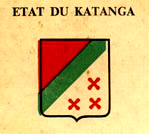 Le
Katanga est tissé à partir d’un héritage, d’une histoire dont la modernité
est scellée, pour la succession de ces trois États-Royaumes ( Lunda, Luba
et Yéké ), par des courants commerciaux polarisés vers les débouchés océaniques
– surtout vers les régions des Grands Lacs – et par une socialisation
hautement structurée dans les principautés inféodées issues des empires.
Le Katanga s’avère donc être une réalité humano-sociale concise et non
pas un conglomérat géographique issu de la colonisation. La période coloniale
a elle-même démontré la spécificité katangaise
Le
Katanga est tissé à partir d’un héritage, d’une histoire dont la modernité
est scellée, pour la succession de ces trois États-Royaumes ( Lunda, Luba
et Yéké ), par des courants commerciaux polarisés vers les débouchés océaniques
– surtout vers les régions des Grands Lacs – et par une socialisation
hautement structurée dans les principautés inféodées issues des empires.
Le Katanga s’avère donc être une réalité humano-sociale concise et non
pas un conglomérat géographique issu de la colonisation. La période coloniale
a elle-même démontré la spécificité katangaise
Penchons-nous maintenant sur
l’aspect de ce qu’on peut nommer la ‘‘Katanganité’’, afin de mieux saisir
en quoi et pourquoi le Katanga peut être appelé une région, une province
du Congo, susceptible d’aspirer à une autodétermination au sein d’une
voie ‘‘confédérale’’ s’ouvrant en R.D.C..
En 1888 le Roi Léopold II,
roi des belges, tenait le discours suivant au sujet du Katanga, discours
adressé au peuple belge après avoir acquis le Katanga, sa concession à
lui :
«
Mes Compatriotes,
Toute
la Belgique et les Belges sont dans la joie d’accueillir le Dr. David
Livingstone qui revient de l’Afrique après avoir accompli une noble mission,
nous ramène la bonne nouvelle de
la conquête
du Katanga
, {…} je viens de créer des sociétés au Katanga dans
lesquelles vous aurez à travailler.
Faites
attention et abstenez-vous d’annexer cette concession avec le reste du
Congo.
Nous
venons de nommer le Gouverneur Général pour le Congo, également un autre
Gouverneur Général est nommé par le Royaume de Belgique pour diriger le
Katanga, ainsi vous remarquerez, qu’
il
s’agit ici de deux pays distincts, l’un différent de l’autre et doivent
rester séparément.
Pour
ce faire, j’ai désigné mon fils le nommé Jean Félix Hemptinne, c’est bien
Lui, qui sera mon Représentant dans notre concession du Katanga.
En
outre, il est strictement interdit formellement de procéder à l’annexion
de ces deux pays, qui sont tout à fait séparés l’un de l’autre.
Je vous envois pour mieux développer ce Katanga, votre deuxième patrie
où vous y resterez paisiblement et sans craindre à jamais. Je vous en
remercie ».
Sé/LEOPOLD II
Roi des Belges
Par Louis Cheminon.
Rapporteur au Palais Royal
Laken/Bruxelles
Belgique
Qu’est-ce que cela veut dire
? Cela veut dire qu’à la Conférence de Berlin de 1884, le Katanga ne faisait
pas partie de l’État Indépendant du Congo, mais qu’en 1888, après la conquête
du Katanga, le Roi Léopold II fait du Katanga un État tout à fait distinct
de l’État Indépendant du Congo.
Plus tard, le 02 août 1889,
le roi Léopold II, établit son testament, que pouvons-nous lire dans ce
testament ? Le voici ci-dessous :
«
Nous, Léopold II, Roi des Belges, Souverain de l’État Indépendant du Congo
Voulant
assurer à notre Patrie bien-aimée les fruits de l’œuvre que depuis de
longues années, Nous poursuivons dans le continent Africain, avec le concours
généreux et dévoué de beaucoup de Belges ;
Convaincu
de contribuer ainsi à assurer à la Belgique, si elle le veut, les débouchés
indispensables à son commerce et à son industrie ;
Déclarons,
par les présentes, léguer et transmettre, après notre mort, à la Belgique,
Nos droits Souverains sur l’État Indépendant du Congo, tels qu’ils ont
été reconnus par les déclarations, conventions et traités intervenus depuis
1884, entre les Puissances étrangères, d’une part, l’Association Internationale
du Congo et l’État Indépendant du Congo, d’autre part, ainsi que tous
les biens, droits et avantages attachés à cette souveraineté ».
Fait à Bruxelles,
le 02 août 1889. (s) Léopold
Remarque ou observation intéressante,
dans ce testament du roi Léopold II, il n’est pas question de léguer,
après sa mort, l’État du Katanga à la Belgique, alors que le Katanga était
une entité tout à fait distincte de l’État Indépendant du Congo, ce qui
veut dire que, par son testament il ne fait que léguer à la Belgique le
reste du Congo, mais pas le Katanga… à ce moment-là le Katanga ne fait
pas partie de l’État Indépendant du Congo de 1884 et Léopold II ne lègue
pas le Katanga à la Belgique dans son testament ! Et, rappelons-le, ce
n’est qu’en 1892 que le Katanga va devenir la sixième région de l’État
Indépendant du Congo… donc, 3 ans après le testament de Léopold II ! On
peut donc dire en quelque sorte, que la Belgique a annexé, en 1892, le
Katanga à l’État Indépendant du Congo, ceci sans avoir le droit de le
faire, vu que le Katanga ne lui avait pas été légué par voie testamentaire
! On peut éventuellement dire, que cette annexion du Katanga fut ‘‘illégale’’
du point de vue juridique !
Allons plus loin : jusqu’en
1936, le Katanga connut un régime spécial, au lieu d’être soumis à l’autorité
du Gouverneur Général de la capitale, Léopoldville, le Katanga relevait
directement du Ministère des Colonies à Bruxelles et un Vice-Gouverneur
Général siégeait à Élisabethville ( Lubumbashi ) au Katanga.
On peut donc estimer que le
Katanga peut, de plein droit, réclamer au minimum l’application du Fédéralisme
au sein des frontières de l’actuelle R.D.C. ( République Démocratique
du Congo )… personne ne peut dire ou affirmer le contraire, personne,
que ce soit au niveau historique et/ou juridique… personne !
TEXTE DE LA CONSTITUTION DE L'ETAT DU KATANGA
Le 4 AOUT 1960
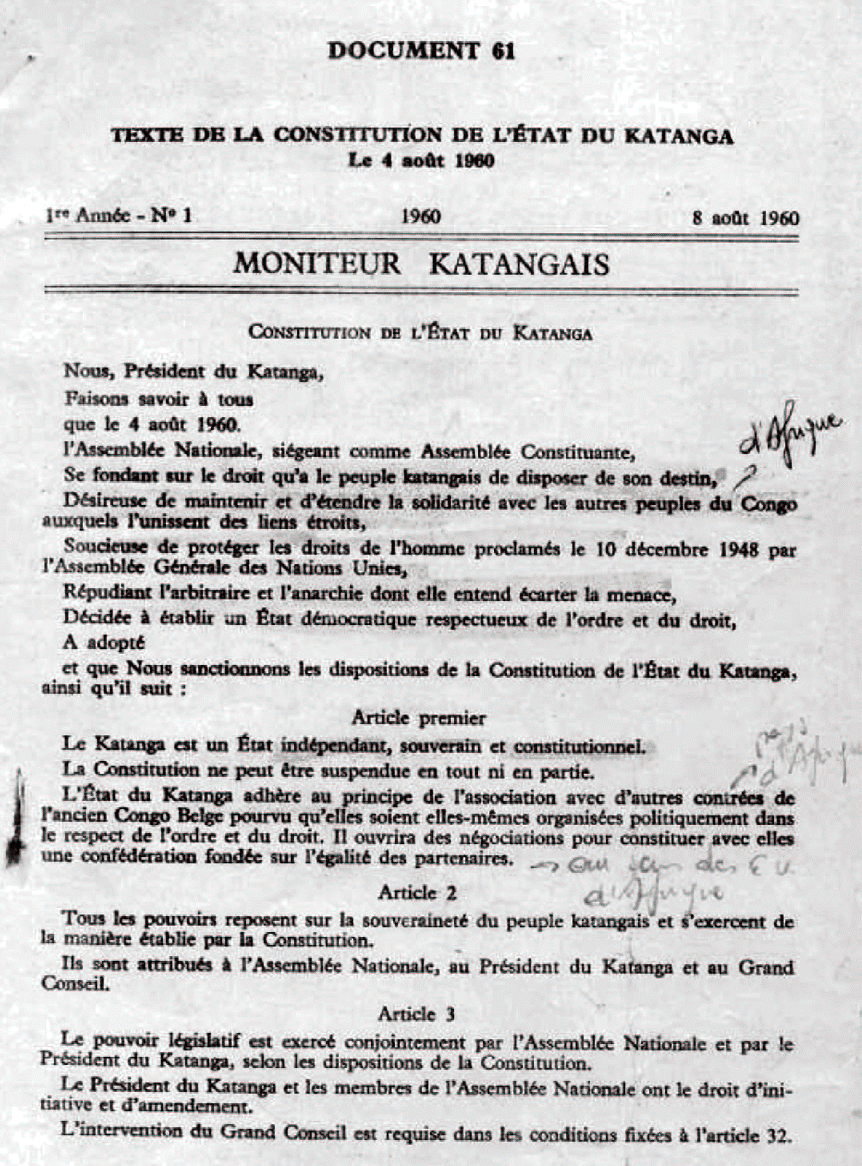
Original Constitution of the Republic
of Katanga 1960
FULL
TEXT OF THE CONSTITUTION OF THE REPUBLIC OF KATANGA 1960 (PDF)
Monitor du Katanga (Flag)
The
Programme of Government
The
Katanga Free State
subscribes to the core values of Constitutional Democracy
Constitutional Democracy
The Ideological Foundations
of State Administration are those of a Constitutional Democracy both in
values, principles and policies:
INDIVIDUAL RIGHTS
- Life
- Liberty
- Freedom of press
- Freedom of speech
JUSTICE
- Due process
- Protection against unreasonable search and seizure
- Rule of law
- Right to a speedy public trial by a jury
THE COMMON GOOD
- Provide for safety and security
- Promote the general welfare
CONSTITUTIONAL GOVERNMENT
- Majorities have right to
make political decisions
- Respect for differences
- Equal protection of the law
- Social equality
- Right to vote and seek office
- Equal employment opportunity
- Equal housing opportunity
Public Safety and
Security
Without Safety and Security,
good governance and the provision of all political goods, is impossible.
Security refers to a nation-state’s
monopoly of violence. If there are insurgencies within the state, violence
against the government in power, or rebellions against authority, the
nation-state is neither safe nor secure for its people. Likewise, if the
state is invaded from outside or has porous borders, the government of
the nation-state cannot provide, as nation-states are mandated to do,
a safe and secure environment for the pursuit of individual or group free
endeavours within the nation-state.
Nor are the citizens of a
modern nation-state safe or secure if the government in power cannot guarantee
their personal security. Citizens demand to be free of mugging, car jacking,
violent crime, and homicide. Thus, personal security is the second major
component of the political good of safety and security. Countries with
lower crime rates are supplying greater quantities and qualities of the
safety segment of the political good of safety and security than those
states where crime is rampant.
The control of the Level of
violent crime in the streets.
Difficulty on the ease of access to small arms and light weapons and its
tight regulation.
National Defence and
Security
To establish a disciplined
and well-trained and organized National Defence Forces.
To establish a well trained motivated Police Force to assure Public Safety
of all citizens.
Providing solutions to prevent armed conflicts.
Providing foreign Refugees
and asylum seekers originating from foreign countries a safe heaven, but
only when in the best interest of the Nation, and only when genuine political
refugees.
Rule of Law, Transparency
and Corruption
Governments and governance
cannot exist or function without the political good called Rule of Law.
Such a designation refers to Common Law or to a codified, transparent
method of adjudicating personal disputes of all kinds, formal and informal
contractual obligations, and disputes between citizens and the nation-state,
without resort to violence. Thus, nation-states with enforceable codes
of law, nation-states that have adhered to international conventions and
legal obligations, and nation-states with judicial mechanisms free of
state control have stronger rule of law regimes and supply larger amounts
of the political good of Rule of Law.
Ratification of all Critical
Legal Norms
Judicial Independence and Efficiency of the Courts of Law
Eradication of Corruption
As the term “rule of
law” highlights “the idea of laws enacted - laid down, legislated
- by an authoritative body.” The protection of the citizen’s
basic human rights and upheld the basic principles of democracy.
To promote the ratification
of all Critical Legal Norms.
To promote the ratification
of core international human rights conventions.
To assist in the implement
of economic and political sanctions in those countries where there are
known human rights violations.
To allow the draft of Laws
on contracts and property rights and other important areas for which clear
legal norms are key to the development of the economy.
To assure the Existence of
an Independent and Efficient Judicial System.
To assure the Existence of
the Judicial independence, based on the rule of law.
To assure the independence
and Efficiency of the courts in all matters pertaining to legal justice.
To assure the Efficiency of
national institutions regarding contract enforcement, Doing Business measures
the efficiency (in days) of “contract enforcement following the
evolution of a sale of goods dispute and tracking the time involved from
the moment the plaintiff files the lawsuit until actual payment.”
Corruption
To eradicate corruption in
the Government and Public sector.
Citizens Participation
and Human Rights
To promote the political good
of political freedom has an essential tool to good governance. It includes
Participation—the ability to contest elections freely; Respect for
Basic Human Rights—all of the essential liberties and rights; and
the Absence of Gender Discrimination.
To prevent discrimination,
such as discrimination against ethnic groups and religious minorities
(including ethnic) conflict. Without these components of political freedom,
many other political goods that collectively compose good governance are
difficult to exercise.
The Free and spontaneous Participation
of each Citizens in the public and political life of the Nation.
To allow for Competitive Executive
Elections, based on whether independent observer missions judge national
elections to be “free and fair.”
Participation of main opposition
candidates in Executive Elections.
Competitive Legislative Elections,
based on whether official independent observer missions judge national
elections to be “free and fair.”
Participation of main opposition
candidates in legislative elections.
Respect for Civil and Political
Rights of each State Citizens.
Respect for physical rights
(absence of extra judicial killing, disappearances, torture, and political
imprisonment).
Respect for civil rights (freedom
of movement, political participation, worker's rights, freedom of speech,
and freedom of religion).
To assure Press freedom at
the most basic level.
To assure Absence of Gender
Discrimination.
To advance Women’s Economic
Rights.
To promote Women’s Political
Rights.
To progress Women’s
Social Rights.
Sustainable Economic
Opportunity
To create and maintain Sustainable
Economic Opportunities is an essential political good. Well-governed nation-states
enable their citizens to pursue personal entrepreneurial goals and potentially
prosper. They do so by providing regulatory frameworks conducive to such
prosperity and by creating stable and forward-looking macroeconomic and
fiscal policy environments that facilitate and encourage national and
personal wealth creation. Arteries of commerce—a robust physical
communications and transportation infrastructure—are also critical
to the achievement of these national and personal objectives. Significant,
too, is the extent to which African countries are safeguarding their environments.
Doing so assists in sustaining economic opportunity. In order to measure
the extent to which nation-states are providing this essential political
good and its components.
To incentive Wealth Creation.
To monitor and maintain in
a prosper level the GDP per capita.
To allow for Local and National
Economic growth.
To allow and maintain Macroeconomic
Stability and Financial Integrity.
To implement the necessary
financial mechanisms of good economical governance and responsible control
of the annual inflation rates.
To control and account for
Government budget deficits and surpluses as a percentage of GDP.
To establish the Reliability
of financial institutions and monitor the overall local and national business
environment.
Taxes
Lower taxes benefit all citizens,
creating jobs and allowing citizens to make more decisions for themselves
about their lives.
Lower taxes allow more spending,
saving, and investing which helps the economy - that means all citizens.
The economy and independence
as a nation is increasingly in the hands of foreign governments such as
the Communist and totalitarian regime of the Peoples Republic of China,
this musty be brought to a full stop.
Corporate ethics
The bottom line for corporations
is making a profit. Self-interest is a reliable motivator, and when it
can be channelled in positive ways, society benefits. This positive channelling
will occur only if corporate behaviour is constrained by ethical principles.
In the economic realm, as
in all areas of life, self-interest must be balanced with responsibility
for others. Experience shows that many businesses will operate in a responsible
manner only if they are subjected to clear regulations and careful scrutiny.
Many business people are very
conscientious, and attempt to function in socially responsible ways. Sometimes
they are successful. However, in the absence of appropriate regulations,
businesses that do attempt to operate in a responsible manner sometimes
find they simply cannot compete with their less scrupulous competitors.
For businesses to be able
to function in responsible ways requires attention to the “rules
of the game” within which competition must take place.
Arteries of Commerce
The density of a nation’s
road network (both paved and unpaved) per square kilometre of national
land.
The supply, availability,
reliability and access of electricity to the population.
The development of each African
nation infrastructures of Land Line and Mobile (cellular) telephone network.
Promoting and allowing free access to the Internet and promote the access
to Computers.
Environmental Sensitivity
Environmental health, air
quality, water resources, productive natural resources, biodiversity and
habitat, and sustainable energy. Reduction of environmental stresses on
human health and promotion of ecosystem vitality and natural resource
management.
Human Development
Governments are charged by
their constituents with supplying the political good of effective human
development. Everywhere, especially in Africa, citizens expect their governments
to provide opportunities for educational advancement, health care and
medical and sanitary services, and poverty mitigation and alleviation.
The Federation of African Free States is determined to assist and help
its affiliated Sovereign Nation States to eradicate National Poverty;
the percent of all nationals live on less than US$1 day (the globally
recognized poverty figure).
To implement the mechanisms that permits and allows a fair an equal national
distribution of income.
Publicly Funded Health
Care
Publicly funded health care
financed entirely or in majority part by citizens' tax payments.
Health Outcomes:
To improve the Life expectancy at birth.
To prevent Infant mortality.
To prevent Maternal mortality.
To tackle Undernourishment
in Africa to eradicate the percentage of the population whose food intake
is below the minimum dietary energy requirements.
To increase the percentage of children immunized against measles.
To increase the percentage
of children; aged 12-23 months immunized against diphtheria, pertussis
(whooping cough), and tetanus (DPT).
To provide treatment to people living with HIV, by using traditional methods
and new discovery treatments.
To control and treatment for all TB cases (incidence).
To provide to all African Citizens Access to qualified physicians: and
increase the density of physicians per 1000 people.
To provide to all African Citizens Access to trained nurses: and increase
density of nurses per 1000 people
To establish an infrastructure that will enable the total of the population
with access to potable water.
Educational Opportunity
To establish and maintain
a high level of Adult literacy.
To establish and maintain
a high level of Adult literacy among women, men and children.
To establish and maintain
a high level of Primary school completion rate (the percentage of school-aged
children who complete the last year of primary school)
To establish and maintain a high level of Primary school completion rate
among girls.
To establish and maintain
a high level of Pupil/Teacher ratio in primary schools.
To establish and maintain
a high level of Persistence: Progression of all students from primary
to secondary school.
Social Security
The establishment of a fully
working African Social Welfare Service concerned with social protection,
or protection against socially recognized conditions, including poverty,
old age, disability, unemployment and others.
1. Social insurance, where
people receive benefits or services in recognition of contributions to
an insurance scheme. These services will include provision for retirement
pensions, disability insurance, survivor benefits and unemployment insurance.
2. Income maintenance; distribution of cash in the event of interruption
of employment, including retirement, disability and unemployment.
3. Basic General Security, African citizens access to basic necessities;
such as food, clothing, shelter, education and medical care.
African Independence
and Sovereignty
So called free trade deals
and world governmental organizations are a threat to independence as nations.
They transfer power from our African governments to unelected foreign
elites, such as the Communist Peoples Republic of China.
Withdrawal from all and any
organizations and trade deals that infringe upon the freedom and independence
of the African States.
VIDEO
- Katanga the United Nations Betrayal
Katanga throughout
its History has always been a separate Nation
If left to run Katanga by
themselves black and white Katangese could have created a great multiracial
nation and made famous success of it. Katanga would have been a shinning
example to the rest of Africa, even the world. This magnificent occasion
was lost in 1963, largely because the interference by an ignorant American
administration, which knew nothing of Africa on the one hand, and the
stupidity of the United Nations, which knew, even less on the other. As
a result, the birth right of all Katangese black and white had been forfeited
and the clock put back another twenty years.
Katanga throughout its History
has always been a separate Nation. Katanga has always been a separate
country from that so called DRC, Katanga is fundamentally different in
many important respects from the other regions. It was only the drawing
of arbitrary boundaries on a map in 1885 at some conference in Europe
that had turned the Nation of Katanga into part of the DRC, a hodgepodge
of over two hundred twenty different Tribes. Geographically too Katanga
and the other provinces were different. The Katangese terrain for a start
was high and open, mostly ranch type country unsuitable for agriculture,
unlike the rest of the other regions. Then again the Katangese spoke Swahili,
the other regions spoke Chiluba, Lingala and Kikongo. The Katangese find
irksome and impractical to be ruled by a remote legislature in Kinshasa
some 2,500km away. Ethnically Katanga’s People are entirely separate
from the other Tribes in the DRC as well.
The difference between the
Katangese and the People of Bas-Kongo is as marked as that between a Ukrainian
in Russia and a Flamand in Belgium.
The tragedy of the Katangese
politics is that Katanga between 1961 an 1963 had become a political football
game. Too many outsiders, many of them newly independent African states
like Ghana, with no real knowledge of the country or its problems, where
involved in deciding its future, for that reason that had nothing whatever
to do with the DRC. Even the Belgians themselves had done much to force
Patrice Lumumba on the DRC as its first prime minister – Lumumba,
an ex-postal clerk who had to be taken out of prison, where he was serving
a sentence for petty theft, in order to attend the very conference in
Brussels which then brought him to power! And why? Because the Belgian
government wanted a unitary state so that Belgium could perpetuate its
control of the DRC, and Lumumba was the only politician whose manifesto
would have permitted that policy.
Edouard Lambrette
In "The Road
to Kalamata", Page 111
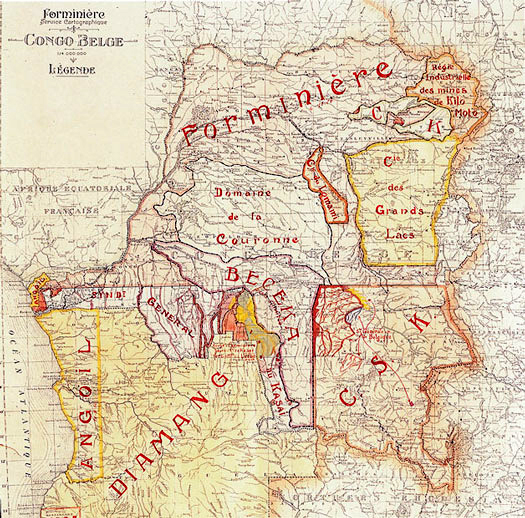
Were a map of the so called
Belgium Congo Central Southern Africa laid upon a map of Europe, with
the mouth of the Congo River where France and Spain meet at Biarritz,
the boundaries of the Congo would reach south to the heel of Italy, to
Greece, to Smyrna; east to Constantinople and Odessa; northeast to St.
Petersburg and Finland, and northwest to the extreme limits of Scotland.
